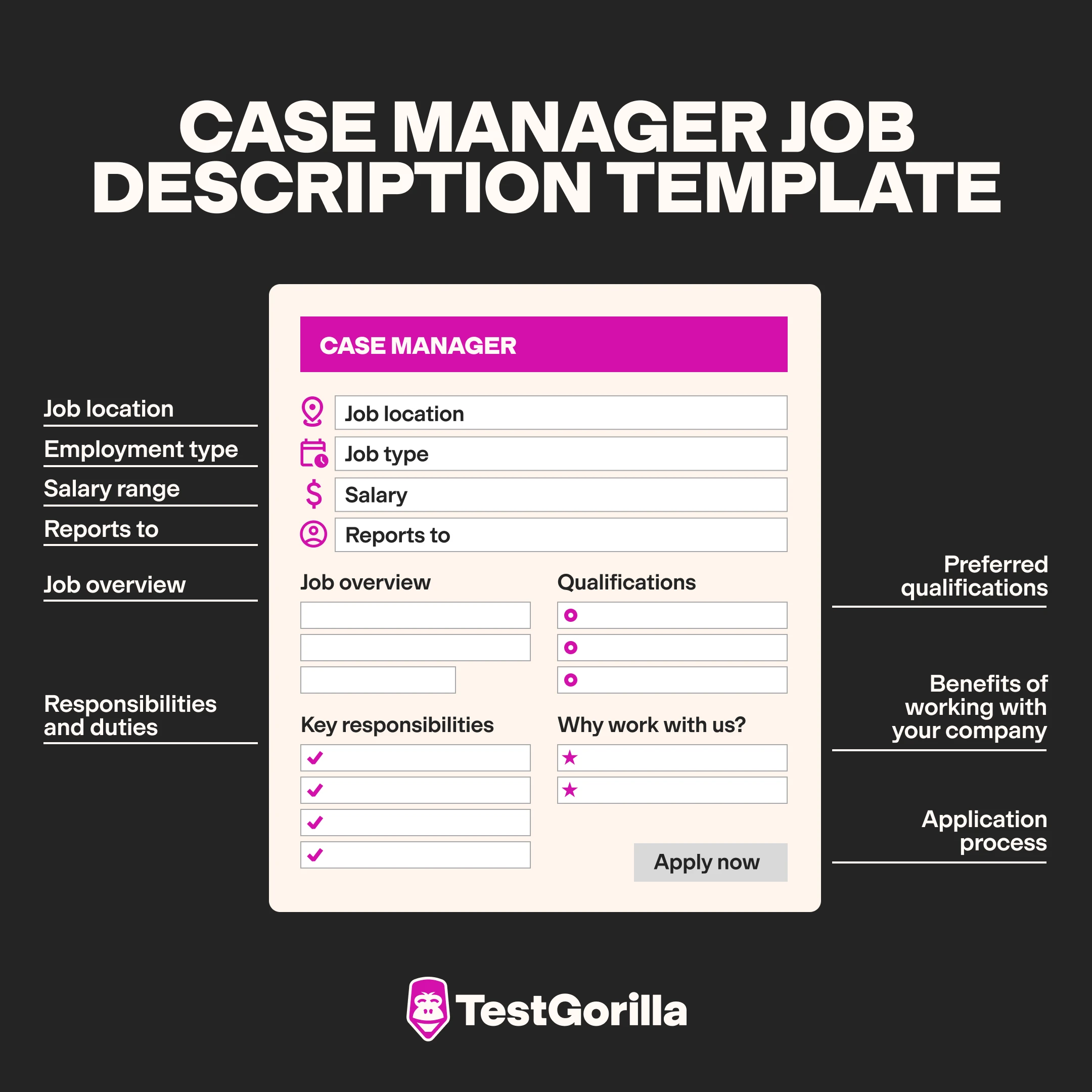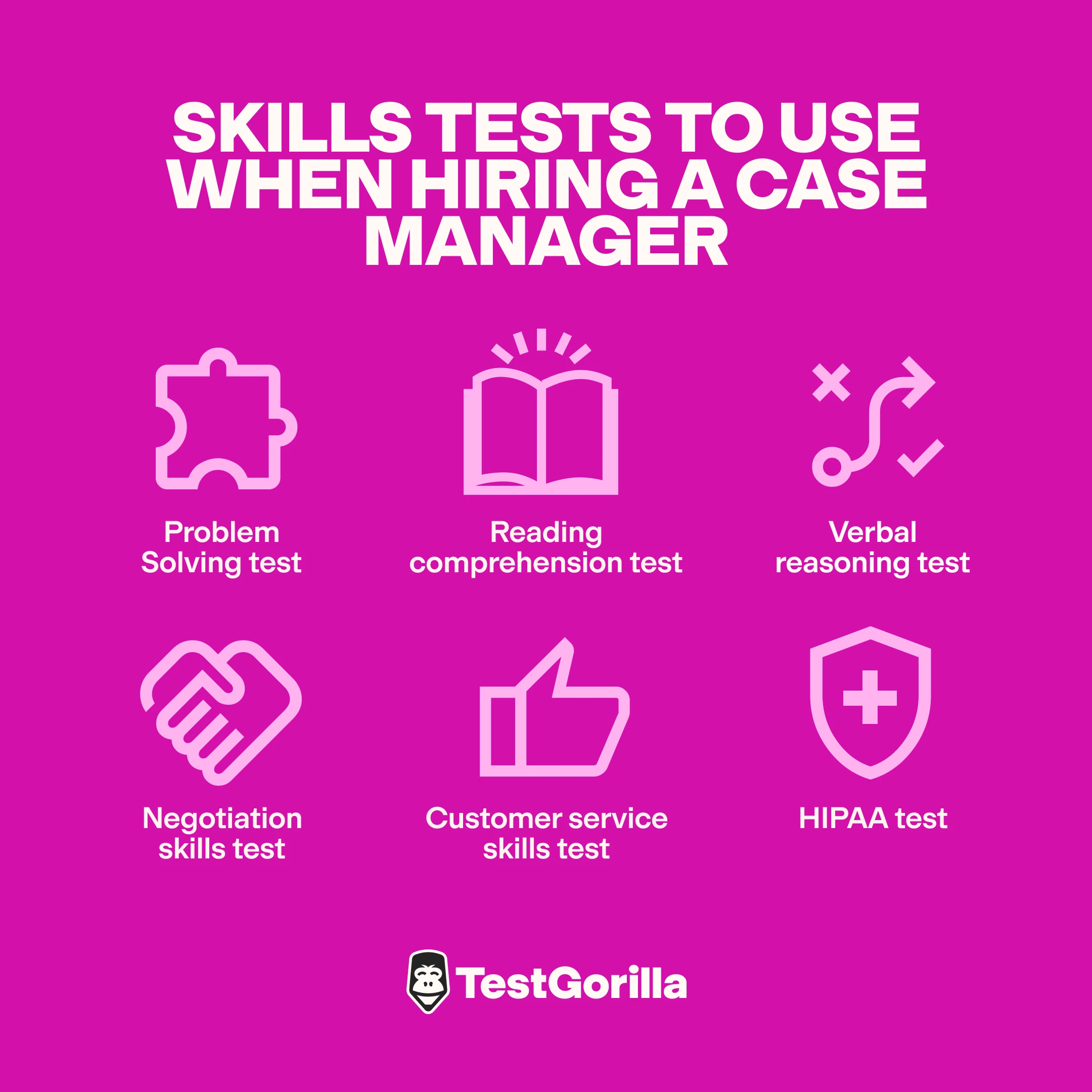Case manager job description template: Everything you need to include
A great case manager job description can lure in top-notch candidates. But writing this job description isn’t straightforward. How can you capture the unique blend of advocacy, empathy, and organizational skills that these candidates need – without overwhelming potential applicants or underrepresenting their duties?
Don’t worry – we’ve got you covered. Keep reading for a free case manager job description template. Plus, we include some handy pre-employment tests to help you find your next great hire.
Case manager job description template
Job Title: Case Manager
Location: [Insert Location]
Employment Type: [Full-Time/Part-Time/Contract]
Salary Range: [Insert Salary Range]
Reports To: [Insert Reporting Line]
Job Overview
We are seeking a compassionate and highly organized Case Manager to join our team at [Company Name]. As a Case Manager, you will play a pivotal role in coordinating and delivering personalized care and support services to our clients, ensuring they achieve their goals and improve their quality of life. Your responsibilities will involve assessing client needs, developing care plans, and collaborating with a multidisciplinary team to deliver comprehensive support.
Key Responsibilities
- Client Assessment: Conduct thorough assessments of clients to understand their individual needs, challenges, and goals. Use this information to develop tailored care and rehabilitation plans.
- Care Coordination: Coordinate and manage the implementation of care plans, ensuring that clients receive the necessary support services, including healthcare, social services, and community resources.
- Goal Setting: Collaborate with clients to establish clear, achievable goals and regularly review and adjust plans to ensure progress towards these goals.
- Documentation: Maintain accurate and up-to-date records of client interactions, assessments, care plans, and progress notes in accordance with company policies and regulatory requirements.
- Collaboration: Work closely with healthcare providers, social workers, and other professionals to ensure a holistic approach to client care.
- Advocacy: Act as an advocate for clients – helping them navigate complex healthcare and social service systems and ensuring they have access to the resources they need.
- Monitoring & Evaluation: Continuously monitor client progress, make adjustments to care plans as needed, and evaluate the effectiveness of interventions.
- Compliance: Ensure that all care provided meets legal, ethical, and company standards, including compliance with CQC regulations, NICE guidelines, and internal policies.
Necessary Qualifications & Skills
- Educational Background: Bachelor’s degree in social work, nursing, psychology, or a related field – or equivalent experience or training.
- Data Management Skills: Proficiency in using case management software and systems to record, track, and analyze client information.
- Knowledge of Healthcare Systems: Understanding of healthcare services, insurance policies, and medical terminology, particularly for those working in medical or health-related case management.
- Legal Compliance: Familiarity with relevant laws and regulations such as HIPAA for healthcare privacy, ADA, or other applicable legal frameworks that affect client care.
- Documentation and Reporting: Ability to accurately document case notes, reports, and client histories to maintain records and communicate with other professionals.
- Assessment and Evaluation: Skills for assessing client needs and evaluating the effectiveness of the interventions and support provided.
- Research and Care Planning: Proficiency in researching various conditions, treatments, and services, coupled with the ability to create comprehensive, personalized, and evidence-based care plans that address the unique needs of each client.
- Negotiation Skills: Ability to negotiate effectively with service providers, landlords, healthcare providers, or insurance companies to secure services, resources, or accommodations for clients.
- Communication Skills: Strong verbal and written communication skills, with the ability to interact effectively with clients, families, and professionals.
- Problem-Solving: Excellent problem-solving skills, with a proactive approach to overcoming challenges and finding solutions.
- Empathy & Compassion: A deep understanding of and commitment to the emotional and psychological needs of clients, with the ability to provide compassionate and empathetic care.
- Organizational Skills: Highly organized, with the ability to manage multiple cases simultaneously and prioritize tasks effectively.
- Travel: Must have a valid driver’s license and willingness to travel as required to meet client needs.
Preferred Qualifications
- Educational Background: A master’s degree or relevant certification in case management.
- Experience: Minimum of [Number] years of experience in case management, social work, or a related field. Experience managing complex cases and working within a multidisciplinary team is highly desirable.
Why Work with Us?
We ensure that each team member is equipped to make a real difference in the lives of our clients. We offer a supportive work environment, ongoing professional development opportunities, and a culture that values collaboration, innovation, and excellence.
Application Process
If you’re passionate about making a positive impact on others’ lives and meet the qualifications we outline above, we encourage you to apply. Please submit your [Application Materials] detailing your relevant experience and why you would be a great fit for this role.
Why this case manager job description template works
We’ve carefully designed this job description to help you find your next case manager.
The job overview is close to the top of the template since candidates want to know right away if the role lines up with what they’re looking for – plus whether they’ll vibe with your company culture. Without this upfront clarity, you may end up with ill-fitting applicants – leading to wasted time for both parties.
The “Key Responsibilities” section highlights the real-world tasks a case manager handles every day. This gives candidates a good idea of what the job truly involves – so they can decide if they can handle the workload.
The “Qualifications and Skills” section heavily prioritizes hard and soft skills, showing candidates the combo of skills you expect them to possess. Those without the skills you need are less likely to apply, which means you’re less likely to hire the wrong person. After all, employers who hire for skills see fewer mis-hires.
Top tip: Don’t use language that can deter specific groups from applying to your role, such as “dynamic” or “tech savvy.” This could put off those who are perfectly qualified but might not see themselves fitting that label. Focus on the skills that truly matter for a case manager.
The best insights on HR and recruitment, delivered to your inbox.
Biweekly updates. No spam. Unsubscribe any time.
Next steps: Attracting and assessing case manager candidates
After writing your case manager job description, you can post your job description where top candidates are likely to see it.
Once you have a few strong applicants, invite them to take an assessment with TestGorilla’s talent discovery platform.
With over scientifically validated 350+ tests, TestGorilla is sure to offer something that works for you. You can even customize tests and combine up to five into a single assessment. We have various tests for case managers, including our:
Pair these with the Culture Add test or Big 5 Personality test to find someone who’ll gel well with your current team.
Sign up for a free plan with TestGorilla today and see the difference a skills-based hiring approach can make to your recruitment. Alternatively, book a free live demo and get to know our platform a little better.
FAQs
What makes a good case manager?
Case managers need a mix of hard and soft skills to successfully support their clients. For example, they must be empathic, organized, and good at communicating – plus great at documenting cases, creating evidence-based care plans, and complying with legal regulations. According to Sherri Eisenstein, a case management consultant and leader, passion is an important trait – good case managers are passionate about helping clients.
What’s the difference between a nurse manager and a case manager?
A case manager helps clients access the services they need – like healthcare, social services, or housing – working as a go-between for clients and service providers. In contrast, nurse managers run nursing teams in settings like hospitals and clinics, focusing on staff management and making sure patients get quality care.
Is case management stressful?
Being a case manager can be stressful. Case managers often work with clients experiencing tough life challenges, juggle multiple cases at once, struggle to secure resources their clients need, and more. However, with the right skills – including problem solving, communication, and negotiation – candidates can effectively support clients without becoming overwhelmed.
Related posts
You've scrolled this far
Why not try TestGorilla for free, and see what happens when you put skills first.




















